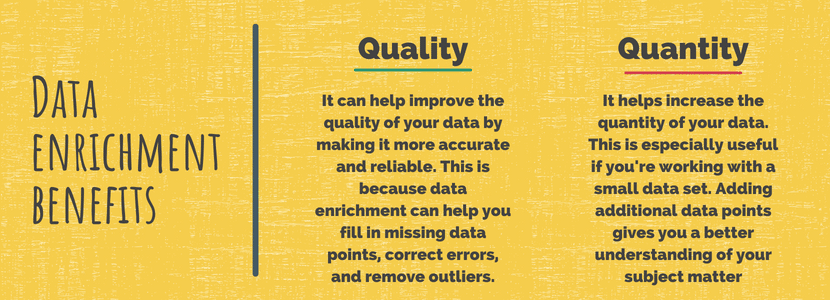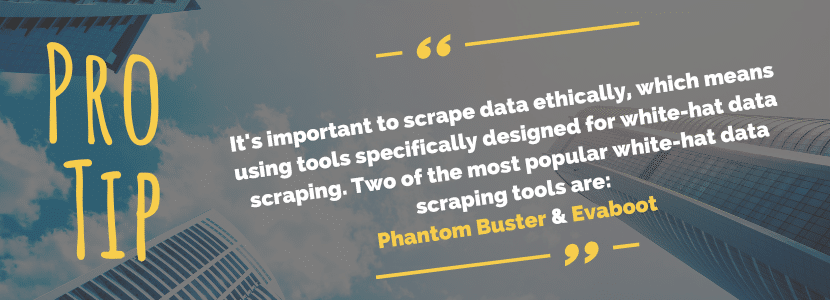Generating leads for small business like yours is essential to your success and survival. For this reason, you’re probably always looking for new and innovative ways to find more leads for local businesses.
If you are wondering, ‘how to generate leads for local business?’ or specifically, ‘how to generate local leads?’ Data scraping is your answer!
Data scraping is a great way to bring more value to your local leads generation strategy. But what exactly is it, and how can a local business lead generation agency use it to help your business? Keep reading to find out!
What is data scraping?
Data scraping simply refers to the process of extracting data from a given source. More specifically, data scrapers – software used by individuals or local leads generation agencies – extract information from websites to create a database of leads or other valuable information.
This can be an extremely effective way to gather contact information for potential ideal customers or any other type of data you might need. Many lead generation companies for small businesses utilize data scraping to efficiently compile targeted contact lists.
For example, suppose you want to scrape the email addresses of individuals on LinkedIn, which has 830 million members. In that case, you can use your data scraper to gather information only from the users with specific interests or pain points that your product or service caters to. Then, with the contact information of so many targeted leads in your possession, you can use different inbound marketing strategies to turn them into potential customers.
Data scraping can be a powerful tool for businesses of all sizes, whether you’re located in Nashville, Tennessee, or London, England. By automating the data collection process, data scraping can help you quickly gather large amounts of local business leads from various sources. This information can then be used for different purposes, including market research, competitive analysis, and local lead gen.
What is data enrichment?
“Data enrichment” is a term often used in conjunction with data scraping. Enriched data is additional information that you research and add to your existing data set to improve its quality or quantity. This process can either be done manually, or automatically through additional data scraping rounds.

Data enrichment is beneficial for a couple of reasons. First, it can help improve the quality of your data by making it more accurate and reliable. This is because data enrichment can help you fill in missing data points, correct errors, and remove outliers.
Additionally, lead generation companies for small businesses often use data enrichment to ensure their contact lists are comprehensive and precise.
Second, data enrichment helps increase the quantity of your data. This is especially useful if you’re working with a small data set. Adding additional data points gives you a better understanding of your subject matter, which ultimately makes the information more valuable and relevant.
The challenges of data scraping and data enrichment
Data scraping can be a valuable tool in a local lead generation system, whether you’re trying to enrich your current data set or build one from scratch. Of course, it’s not without its challenges. Inaccurate data is one of the biggest problems with both data scraping and data enrichment.
Sometimes, data is scraped incorrectly, resulting in incomplete or erroneous information. This can be frustrating and time-consuming to fix, especially when working with large data sets. And if you’re enriching your data manually, you must be careful not to introduce any errors yourself. Utilizing automated tools can be especially beneficial when gathering leads for local businesses to ensure accuracy and efficiency.
Another challenge of data scraping and enrichment is dealing with data sets that are constantly changing. For example, people are constantly changing jobs, making it difficult to keep your data up-to-date. This often leads to stale, outdated information over time. Finally, data scraping can be resource-intensive. Scraping can take a lot of time and effort, depending on the size and complexity of the data set. All of these challenges can make data scraping a frustrating process.
Is data scraping legal?
You may wonder how accessing all of this information online could be legal and ethical. While data scraping can be questionable in some cases, there are circumstances in which it is completely white-hat. For instance, lead generation for local businesses often relies on publicly available information, making the process both legal and ethical. Let’s review a case study to illustrate this point.
LinkedIn vs. HiQ
The LinkedIn vs. HiQ case started in 2017 when HiQ, a data analytics company, received cease-and-desist letters from LinkedIn because LinkedIn didn’t like that HiQ was scraping data from their website. LinkedIn claimed that this data scraping violated their users’ privacy, and they restricted HiQ’s access to their site, claiming that HiQ violated the Computer Fraud and Abuse Act (CFAA).
In return, HiQ filed a complaint against LinkedIn and claimed that LinkedIn didn’t have the right to block them from scraping users’ public data – information that users had made public on the site of their own volition. HiQ claimed that scraping public data did not violate users’ privacy rights.
Ultimately, the courts determined that HiQ was not violating the CFAA because that law only applies to the illegal access of information – like accessing password-protected data without authorization. The CFAA does not apply to the legitimate accessing of data, regardless of the intended use of that information.
Based on this ruling, it’s safe to conclude that data scraping information that users have made public themselves is completely legal.
When data scraping is not legal
Unfortunately, the line between legal data scraping and illegal data scraping can sometimes be blurred. As discussed above, data scraping is legal as long as you take publicly available data.
For example, if you or a local lead generation agency scraped a list of email addresses from a public website, such as LinkedIn, and you use those email addresses to contact their owners professionally, that would be legal. Even using the scraped data for negative purposes wouldn’t technically violate the CFAA.
However, if you or a local lead generation agency scraped that same list of email addresses from a private website – a process that required you to hack into the site without having authorization – that would be illegal. The same goes for other data types, like credit card numbers or passwords. If the data is public, you’re free to scrape it; if it’s private, you’re not.
Additionally, when selling leads to local businesses, it’s crucial to ensure that the sourced data is obtained legally and ethically.
The best tools for white-hat data scraping
Data scraping is a useful method for marketing research and generating leads for small business. However, it’s important to scrape data ethically, which means using tools specifically designed for white-hat data scraping. Here are two popular white-hat data scraping tools:

- PhantomBuster is one of the leaders in white-hat data scraping services for businesses of all sizes. PhantomBuster stands out from other tools because of their scheduled triggers. These triggers allow for data to be updated regularly, which increases its accuracy. PhantomBuster also offers the ability to move scraped data from multiple portals through what they call chained Phantoms that help further automate the process.
- Evaboot is one of the best data scraping services on the market. Not only does it offer both data scraping and data enrichment, but it also has an independent filter to remove inaccurate contacts that made it on your list. However, one potential downside is that it only scrapes from LinkedIn’s database.
There are countless data scraping tools on the market. But before engaging with any of them, make sure you understand your goals with data collection and the areas of your business that you are looking to improve. We also recommend utilizing the free trial that many of these tools offer to truly see which one is the best fit for your business.
Want help with data scraping from a Nashville local lead generation
agency?
If you want to be successful in local business lead generation, data scraping is a valuable tool you should add to your arsenal. By scraping the internet for contact information of potential leads, you can streamline and target your efforts, which will save you valuable time and energy.
And if you need help with data scraping for your business, Take the Stairs is a local lead generation agency based in Nashville, TN that can provide all the assistance you need. Contact us today to learn more about how we can help you with data scraping.



